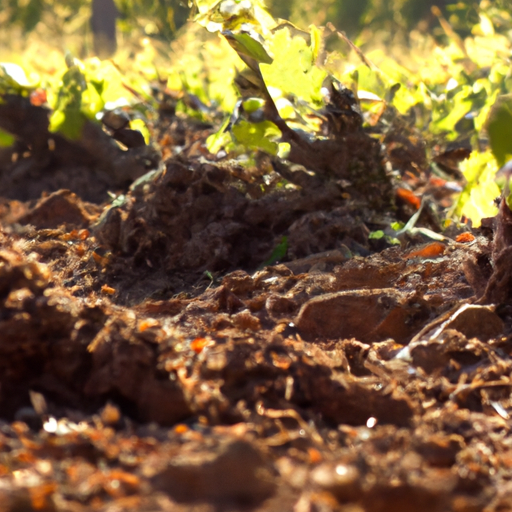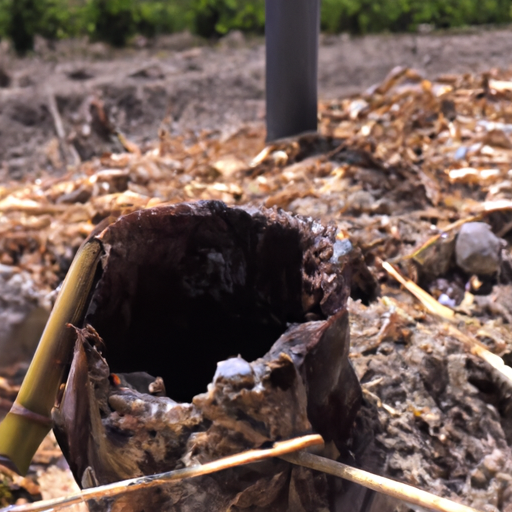
The Benefits of Biochar in Vineyard Management
The Benefits of Biochar in Vineyard Management
Vineyards have long been an integral part of the agricultural landscape, producing some of the finest wines in the world. However, with the increasing challenges posed by climate change and the need for sustainable farming practices, vineyard owners and managers are constantly seeking innovative solutions to improve their operations. One such solution that has gained significant attention in recent years is the use of biochar in vineyard management.
Biochar, a form of charcoal produced from organic waste materials, has been used for centuries as a soil amendment. Its unique properties make it an ideal addition to vineyard soils, offering a range of benefits that can enhance both the quality of the grapes and the overall sustainability of the vineyard.
One of the primary benefits of biochar is its ability to improve soil fertility. When biochar is added to the soil, it acts as a sponge, absorbing and retaining nutrients and moisture. This not only reduces the need for synthetic fertilizers and irrigation but also helps to prevent nutrient leaching, ensuring that the vines receive a steady supply of essential nutrients throughout the growing season.
In addition to its fertility-enhancing properties, biochar also improves soil structure. Its porous nature creates channels for air and water movement, promoting aeration and drainage. This is particularly important in vineyards, where compacted soils can hinder root development and lead to poor vine health. By incorporating biochar into the soil, vineyard managers can create a more favorable environment for root growth, resulting in healthier and more resilient vines.
Furthermore, biochar has been found to enhance soil microbial activity. The porous structure of biochar provides a habitat for beneficial microorganisms, such as mycorrhizal fungi, which form symbiotic relationships with plant roots and aid in nutrient uptake. These microorganisms also help to suppress harmful pathogens, reducing the need for chemical pesticides and fungicides. By fostering a diverse and thriving microbial community, biochar contributes to the overall health and resilience of the vineyard ecosystem.
Another significant advantage of biochar is its ability to sequester carbon. When organic waste materials are converted into biochar, the carbon they contain is stabilized and locked away in the soil for hundreds, if not thousands, of years. This not only helps to mitigate climate change by reducing greenhouse gas emissions but also improves soil quality over time. By incorporating biochar into their vineyard management practices, vineyard owners can play a crucial role in carbon sequestration and contribute to a more sustainable future.
In conclusion, the use of biochar in vineyard management offers a range of benefits that can enhance both the quality of the grapes and the overall sustainability of the vineyard. From improving soil fertility and structure to enhancing microbial activity and sequestering carbon, biochar provides vineyard owners and managers with a powerful tool to address the challenges posed by climate change and promote sustainable farming practices. As the future of vineyards unfolds, embracing biochar is a step towards a more resilient and environmentally conscious approach to grape cultivation.
Implementing Biochar Techniques for Sustainable Vineyard Practices

The Future of Vineyards: Embracing Biochar
Implementing Biochar Techniques for Sustainable Vineyard Practices
In recent years, the concept of sustainability has gained significant attention across various industries, including agriculture. Vineyards, in particular, have been exploring innovative methods to ensure the long-term viability of their operations while minimizing their environmental impact. One such technique that has been gaining traction is the use of biochar.
Biochar is a type of charcoal that is produced through the process of pyrolysis, which involves heating organic materials, such as agricultural waste or wood chips, in the absence of oxygen. This process results in a highly porous and stable carbon-rich material that can be used as a soil amendment. When incorporated into vineyard soils, biochar has the potential to improve soil fertility, enhance water retention, and sequester carbon dioxide from the atmosphere.
One of the primary benefits of using biochar in vineyards is its ability to improve soil fertility. The porous structure of biochar provides a habitat for beneficial microorganisms, such as mycorrhizal fungi, which can enhance nutrient uptake by the grapevines. Additionally, biochar has a high cation exchange capacity, meaning it can hold onto essential nutrients like potassium, calcium, and magnesium, preventing them from leaching out of the soil. This can result in healthier vines and higher-quality grapes.
Another advantage of incorporating biochar into vineyard soils is its ability to enhance water retention. The porous nature of biochar allows it to absorb and retain water, reducing the need for irrigation. This is particularly beneficial in regions with limited water resources or during periods of drought. By improving water retention, biochar can help vineyards become more resilient to climate change and reduce their reliance on irrigation, ultimately leading to more sustainable practices.
Furthermore, biochar has the potential to sequester carbon dioxide from the atmosphere, making it an effective tool in combating climate change. When organic materials are converted into biochar, the carbon they contain becomes stable and is stored in the soil for hundreds, if not thousands, of years. This carbon sequestration not only helps to mitigate greenhouse gas emissions but also improves soil health by increasing its organic matter content. By incorporating biochar into their vineyard soils, winemakers can play a significant role in reducing their carbon footprint and contributing to a more sustainable future.
Implementing biochar techniques in vineyards does come with some challenges. One of the main obstacles is the availability and cost of biochar. Producing biochar requires specialized equipment and expertise, which can be costly for vineyard owners. Additionally, the sourcing of organic materials for biochar production must be carefully managed to ensure sustainability and avoid competition with other industries, such as food production. However, as the demand for biochar increases, advancements in technology and economies of scale are likely to make it more accessible and affordable for vineyards.
In conclusion, the future of vineyards lies in embracing biochar as a sustainable practice. By incorporating biochar into their soils, vineyard owners can improve soil fertility, enhance water retention, and sequester carbon dioxide. While there are challenges to overcome, the potential benefits of biochar make it a promising solution for the long-term viability of vineyards. As the industry continues to prioritize sustainability, the adoption of biochar techniques is likely to become more widespread, paving the way for a greener and more sustainable future for vineyards.
Exploring the Potential of Biochar in Enhancing Vineyard Productivity
The Future of Vineyards: Embracing Biochar
Exploring the Potential of Biochar in Enhancing Vineyard Productivity
In recent years, the agricultural industry has been increasingly focused on finding sustainable and environmentally friendly practices. One such practice that has gained attention is the use of biochar in vineyards. Biochar, a type of charcoal produced from organic waste, has shown great potential in enhancing vineyard productivity while also reducing the environmental impact of grape cultivation.
Biochar is created through a process called pyrolysis, which involves heating organic waste materials, such as wood chips or agricultural residues, in the absence of oxygen. This process not only produces a stable form of carbon that can be stored in the soil for hundreds of years but also releases gases that can be used as a source of renewable energy. By converting organic waste into biochar, vineyards can effectively reduce their carbon footprint and contribute to the fight against climate change.
One of the key benefits of using biochar in vineyards is its ability to improve soil fertility and structure. When biochar is added to the soil, it acts as a sponge, absorbing and retaining water and nutrients. This helps to prevent nutrient leaching and water runoff, ensuring that the vines have a steady supply of essential elements for growth. Additionally, biochar enhances soil aeration and drainage, creating a favorable environment for root development and reducing the risk of waterlogging.
Furthermore, biochar has been found to promote beneficial microbial activity in the soil. The porous structure of biochar provides a habitat for beneficial microorganisms, such as mycorrhizal fungi, which form symbiotic relationships with plant roots and enhance nutrient uptake. These microorganisms also help to suppress harmful pathogens, reducing the need for chemical pesticides and fungicides in vineyard management.
In addition to its soil-enhancing properties, biochar has been shown to improve vine health and productivity. Studies have demonstrated that vines grown in biochar-amended soils exhibit increased shoot growth, higher fruit yields, and improved grape quality. This can be attributed to the improved nutrient availability and water-holding capacity of the soil, as well as the enhanced microbial activity. By incorporating biochar into their vineyard management practices, grape growers can potentially achieve higher yields and produce grapes of superior quality.
Another advantage of using biochar in vineyards is its ability to sequester carbon in the soil. As biochar is a stable form of carbon, it can remain in the soil for extended periods, effectively removing carbon dioxide from the atmosphere. This not only helps to mitigate climate change but also improves soil health by increasing its carbon content. By sequestering carbon in the soil, vineyards can contribute to carbon offset initiatives and demonstrate their commitment to sustainability.
While the potential benefits of biochar in vineyards are promising, it is important to note that its effectiveness may vary depending on factors such as soil type, climate, and management practices. Therefore, it is crucial for grape growers to conduct site-specific trials and consult with experts to determine the optimal application rates and methods for their vineyards.
In conclusion, biochar holds great potential in enhancing vineyard productivity while reducing the environmental impact of grape cultivation. Its ability to improve soil fertility, promote beneficial microbial activity, and sequester carbon make it an attractive option for sustainable vineyard management. By embracing biochar, grape growers can not only improve their yields and grape quality but also contribute to a greener and more sustainable future for the wine industry.






